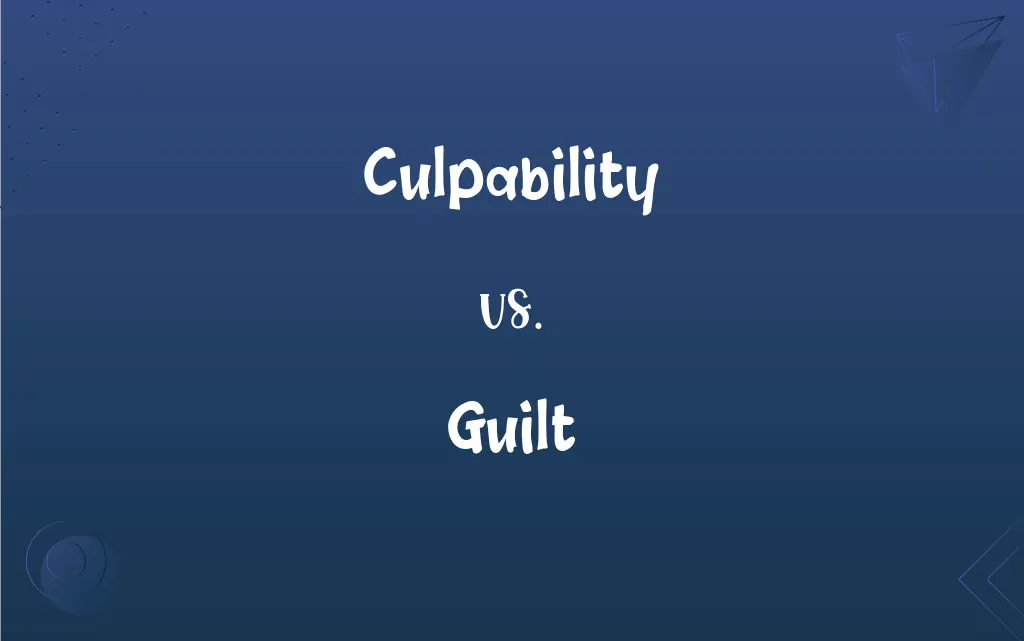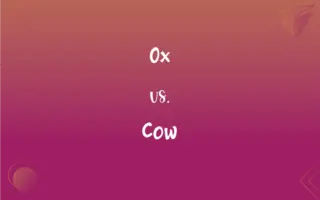Culpability vs. Guilt: What's the Difference?
Edited by Aimie Carlson || By Janet White || Published on November 8, 2023
Culpability denotes the degree of one's blame or responsibility for an action, while Guilt refers to the feeling of remorse for wrongdoing.

Key Differences
Culpability and Guilt, while interconnected, denote different aspects related to wrongdoing. Culpability determines the extent of one's responsibility or blame in an event, often in legal or moral contexts. Guilt, conversely, is the emotional response stemming from the realization or belief that one has done wrong.
Culpability evaluates the level of blame that should be attributed to a person for a specific deed, especially in scenarios involving unintended consequences. It quantifies how accountable a person is for their actions, irrespective of their personal feelings or emotions. Guilt, on the other hand, pertains to the emotional state, the internal conscience that makes someone feel remorseful or regretful for their actions, even if they're not found culpable in an official capacity.
In the realm of law, Culpability is used to determine the degree of blame and, consequently, the severity of punishment or retribution. It often involves analyzing intent, awareness, and the repercussions of one's actions. Guilt, while it can influence legal outcomes—especially in matters of plea or testimonies—is more about personal convictions and moral conscience.
Interestingly, one can feel Guilt without Culpability, and vice versa. Someone may feel guilty about an accident they had no control over, while another might be found culpable for negligence but not feel any personal remorse. It's the intersection of objective evaluation (Culpability) with subjective emotion (Guilt) that defines our responses to wrongdoings.
Comparison Chart
Definition
Degree of blame or responsibility
Feeling of remorse for wrongdoing
ADVERTISEMENT
Context
Legal or moral
Emotional or moral
Relates to
Objective assessment
Subjective emotion
Outcome
Determines accountability & consequences
Influences personal well-being & moral decisions
Origin
From Latin "culpa" meaning blame
Old English "gylt" meaning offense
Culpability and Guilt Definitions
Culpability
The state of being responsible for a fault or wrongdoing.
His Culpability in the accident was clear due to his negligence.
ADVERTISEMENT
Guilt
The emotional pain from believing one has done wrong.
He felt Guilt after lying to his friend.
Culpability
Degree of blame assigned in legal contexts.
The court assessed the Culpability of each defendant.
Guilt
An acknowledgment of error or offense.
She admitted her Guilt in the matter and sought forgiveness.
Culpability
Liability to punishment or penalty.
The suspect's Culpability was determined by the jury.
Guilt
A formal declaration of wrongdoing in law.
The defendant pleaded Guilt to the charges.
Culpability
The quality of deserving censure or blame.
The manager's Culpability was evident in the failed project.
Guilt
A moral emotion associated with ethical standards.
Her Guilt made her apologize and mend her ways.
Culpability
An attribute of actions warranting blame.
Culpability was established based on evidence and testimonies.
Guilt
A consciousness of misdeeds or failures.
His Guilt was evident from his evasive answers.
Culpability
Deserving of blame or censure; blameworthy
"Rajiv's getting remarried without the divorce papers meant that he was equally culpable and that no one would be taking anyone to court" (Samrat Upadhyay).
Guilt
The fact of being responsible for the commission of an offense; moral culpability
The investigation uncovered the suspect's guilt.
Culpability
The degree of one's blameworthiness in the commission of a crime or offence.
Guilt
(Law) The fact of having been found to have violated a criminal law; legal culpability
The jury's job is to determine the defendant's guilt or innocence.
Culpability
The state of being culpable.
Guilt
Responsibility for a mistake or error
The guilt for the book's many typos lies with the editor.
Culpability
A state of guilt
Guilt
A painful emotion experienced when one believes one's actions or thoughts have violated a moral or personal standard
She felt guilt for not having helped the injured animal.
Guilt
To make or try to make (someone) feel guilty
My roommate guilted me for forgetting to wash the dishes.
Guilt
To cause (someone) to do something by arousing feelings of guilt
My roommate guilted me into washing the dishes.
Guilt
Responsibility for wrongdoing.
Guilt
(law) The state of having been found guilty or admitted guilt in legal proceedings.
Guilt
The regret of having done wrong.
Guilt
To commit offenses; act criminally.
Guilt
To cause someone to feel guilt, particularly in order to influence their behaviour.
He didn't want to do it, but his wife guilted him into it.
Guilt
The criminality and consequent exposure to punishment resulting from willful disobedience of law, or from morally wrong action; the state of one who has broken a moral or political law; crime; criminality; offense against right.
Satan had not answer, but stood struckWith guilt of his own sin.
Guilt
Exposure to any legal penalty or forfeiture.
A ship incurs guilt by the violation of a blockade.
Guilt
A feeling of regret or remorse for having committed some improper act; a recognition of one's own responsibility for doing something wrong.
Guilt
The state of having committed an offense
Guilt
Remorse caused by feeling responsible for some offence
FAQs
Is Guilt always tied to real wrongdoing?
No, sometimes people feel Guilt without any actual wrongdoing Colonates.
Is it possible to feel Guilt over accidental events?
Yes, individuals can feel Guilt over events they had no control over.
How does Culpability influence legal outcomes?
Culpability helps determine accountability and the severity of consequences in law.
How do cultures perceive Culpability differently?
Cultural norms and values shape views on blame and responsibility, impacting perceptions of Culpability.
How is Guilt used in psychological contexts?
Guilt is studied as a complex emotion influencing behaviors, relationships, and mental well-being.
Can Culpability exist without legal proceedings?
Yes, Culpability can exist in moral or social contexts without legal involvement.
Can someone be culpable without feeling guilt?
Yes, Culpability is an objective assessment, while Guilt is a personal emotion.
Can Culpability be shared among multiple parties?
Yes, multiple entities can share varying degrees of Culpability.
Can organizations hold Culpability?
Yes, organizations can be deemed culpable for actions or negligence.
How can someone alleviate feelings of Guilt?
Addressing the wrong, seeking forgiveness, and self-reflection can help alleviate Guilt.
Can Guilt be a motivator for positive change?
Yes, recognizing and addressing Guilt can prompt personal growth and positive actions.
Is intent always considered in determining Culpability?
While significant, intent is just one factor among others like consequences and awareness in assessing Culpability.
Why might someone feel Guilt without cause?
Personal values, past experiences, or societal pressures can induce unwarranted Guilt.
Is Culpability always negative?
While it denotes blame, acknowledging Culpability can lead to corrective actions and growth.
How do societal values influence perceptions of Guilt?
Societal norms and ethics shape what's deemed wrong, influencing feelings and expressions of Guilt.
Are remorse and Guilt the same?
They're related, but remorse is deep regret for wrongdoing, while Guilt is the feeling of having done wrong.
How do courts assess Culpability in ambiguous situations?
Courts consider intent, evidence, testimonies, and the broader context to gauge Culpability.
How can Guilt influence interpersonal relationships?
Guilt can lead to reparative behaviors, conflicts, or strained relations.
In what scenarios is Culpability most frequently discussed?
Culpability is often highlighted in legal, moral dilemmas, or ethical discussions.
What's the impact of prolonged feelings of Guilt?
Chronic Guilt can lead to stress, anxiety, depression, or strained relationships.
About Author
Written by
Janet WhiteJanet White has been an esteemed writer and blogger for Difference Wiki. Holding a Master's degree in Science and Medical Journalism from the prestigious Boston University, she has consistently demonstrated her expertise and passion for her field. When she's not immersed in her work, Janet relishes her time exercising, delving into a good book, and cherishing moments with friends and family.
Edited by
Aimie CarlsonAimie Carlson, holding a master's degree in English literature, is a fervent English language enthusiast. She lends her writing talents to Difference Wiki, a prominent website that specializes in comparisons, offering readers insightful analyses that both captivate and inform.






































































